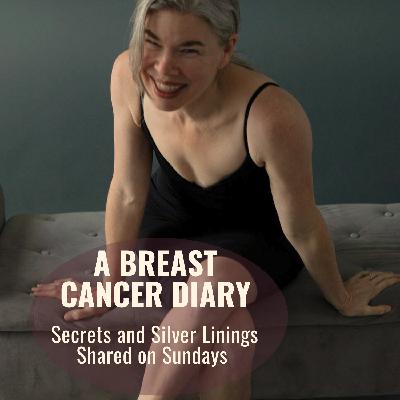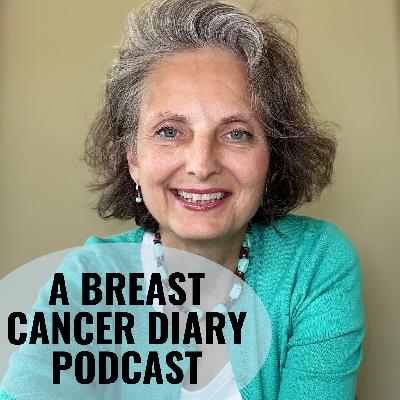Giving Back Through Breast Cancer Advocacy
Description
Today's episode is part two of my advocacy series. I hope it's helpful, but if volunteerism and advocacy isn't your thing, I'll have more stories from guests coming up in the next two weeks!
Subscribe on: APPLE PODCASTS - SPOTIFY - AMAZON
Join my Newsletter Mailing List:
https://abreastcancerdiary.substack.com
Links:
NBCC: https://stopbreastcancer.org
LBCA: https://lobularbreastcancer.org
Tigerlily Foundation (WOC, young ambassadors locally): https://angel.tigerlilyfoundation.org/
Inflammatory Breast Cancer Network: https://theibcnetwork.org/
Project Life MBC (metastatic): https://www.projectlifembc.com/
Project Life MBC/LGBTQ: https://www.projectlifembc.com/project-outreach
MBC Alliance (metastatic): https://www.mbcalliance.org/members/
Triple Negative Foundation: https://tnbcfoundation.org/
Stand Tall AFC: https://standtallafc.org
Not Putting on a Shirt: https://notputtingonashirt.org/whcra/
Make Cancer Less Shitty: https://www.makecancerlessshitty.com/our-ambassadors
Young Survival Coalition (science and legislation): https://youngsurvival.org
The Breasties: https://thebreasties.org/
For the Breast of Us (women of color, national): https://www.breastofus.com/on-podcast/
Cancer Culture (for metastatic patients, event driven, in Virginia): https://www.cancerculture.org/
Today, it's just me again, and I'm going to be talking about advocacy again, this is part two of my two part series on advocacy for breast cancer patients or former patients who are thrivers and survivors. And my first, if you heard. Didn't hear my first edition, uh, to this series. It was about the less intense ways to become an advocate.
The ways to just dip your feet in the water and try it out. Uh, less commitment, less intensity, less time involvement, less, less longevity to the commitment that was last week. Now, this week I'm gonna be talking about the kinds of ways to become an advocate that are longer term, more time intensive, not necessarily, you know.
Something you couldn't do in your evenings and weekends if you're still working full-time, but, uh, a little bit more hardcore advocacy. And like I said last week, it's mainly in the niche areas, in the edges or the margins of breast cancer that you find opportunities to become an advocate, but not always.
So I'm gonna start out by talking about the more mainstream organizations that support breast cancer advocates, the ones that aren't fitting into any of those niche, margin. Topics or populations. So, as you may have guessed, Komen and the American Cancer Society are two of the most visible organizations that work with breast cancer survivors.
Long term, they have mixed reviews. They're, you either love them or you hate 'em. People who are critical of them are critical because a lot of the dollars they raise go back towards the bureaucracy of running their very, very large infrastructure organizations. So it's a little bit of criticism there.
They're doing the best they can, making improvements, aware that they're being criticized. Komen will tend to want to partner with people around just fundraising and awareness raising and visibility for their campaigns.
They have a couple of different campaigns nationwide. The main one is More than Pink and that's just their walks in different towns and cities, you can show up there, bring a team and , get your team to raise money for them, raise visibility for them, and they will be very happy. The other thing that Komen does is they train science advocates and their program is called Advocates in Science.
AIS and once you sign up for that, you'll wanna look in your email inbox to make sure and catch all the a IS emails. I am an advocate in science with Komen, and sometimes I don't know the name of the person that's emailing me from them, but usually they'll put the, the, um, letters A IS in the email. So it's a very hands off.
Uh, advocacy training, it's all online. It's very impersonal. You don't actually get to know any one person in particular. And that, for me, was hard. I like to do a little bit more personal work and be mentored and, I don't know, see people in person when possible. So, AIS is a really good program that I recommend for those of you who are maybe introverts who don't wanna travel across the country.
To go to an in-person advocacy training. And again, that is science advocacy. That is a very particular brand of advocacy. We have mainly two brands of advocacy, um, education and science, and then there's fundraising for those that wanna just do fundraising. So to, oh, and then there's actually, there's four that I'm gonna talk about today.
So education, that's peer-to-peer. Uh, sometimes you can educate your clinician. Usually you're not trying to do that. And uh, science is usually with regard to educating yourself in terms of research so that you can go and be, an advocate in the research community. And then fundraising obviously is really easy.
You just go out and raise funds for whatever organization you support. But then there's also, uh. Legislative advocacy or lobbying. And that's another type of advocacy that you can do for certain types of nonprofit organizations that are not 501c3's. So I'll talk a little bit about that. But most of what I'm gonna talk about today is about education and science.
Um, so. Some of my favorite organizations, oh, and I was gonna say that, um, American Cancer Society, they're the other kind of mainstream, huge monstrous organization that supports breast cancer patients in the world. And they do that by kind of gathering the science and, uh, reporting out on all the numbers.
And, every year there's, you know, different statistics that come out from them. They also do a lot of funding for research as Komen does, and they really like to. Team up with folks in the breast cancer community more personally , choosing one or two representatives, or ambassadors from the breast cancer community locally during the time that they're putting on a walk in the local community.
So they will ask you to raise a certain amount of money as their ambassador, but also they will ask you to go out and publicly speak, maybe get on the news for them so it's a little bit more of a partnership and you'll be mentored a little bit more personally. But it's not educational in nature. It is very much fundraising awareness, raising media, raising for them and for their cause, not necessarily for you or for your cause.
So beyond those two gigantic, kind of global organizations, we've got all of the marginal ones. And so I'm gonna list off a bunch of those and, I don't know a whole lot about all of these, but I know quite a bit about most of them. So I'll start out with some of the ones that I've been involved with that I can tell you personally about.
My favorite one is called the National Breast Cancer Coalition. , they are my favorite because they have invested the most in me, and they are a little bit more of an edgy research organization. So unlike Komen and maybe American Cancer Society, they're doing funding of kind of novel ideas in the breast cancer space.
Uh, they're not investing as much in the kinds of studies, uh, and trials that we've been doing for decades and decades. So they have a little bit different edge on, thei







